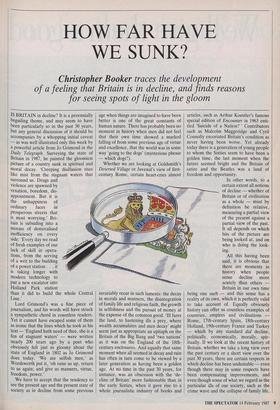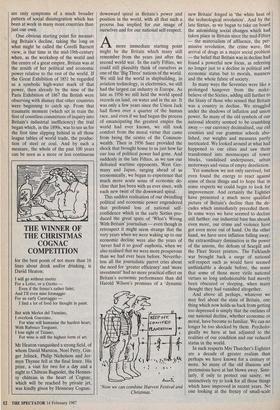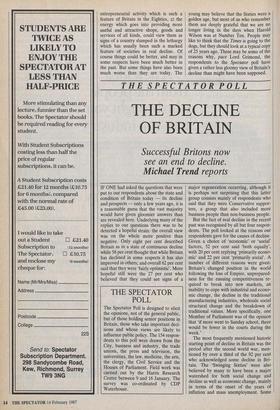HOW FAR HAVE WE SUNK?
Christopher Booker traces the development
of a feeling that Britain is in decline, and finds reasons for seeing spots of light in the gloom
IS BRITAIN in decline? It is a perennially beguiling theme, and may seem to have been particularly so in the past 30 years, but any general discussion of it should be accompanies by a whopping initial caveat — as was well illustrated only this week by a powerful article from Jo Grimond in the Daily Telegraph. Surveying the state of Britain in 1987, he painted the gloomiest picture of a country sunk in spiritual and moral decay. 'Creeping disillusion rises like mist from the stagnant waters that surround us. Drugs and violence are spawned by vexation, boredom, dis- appointment. But it is the unhappiness of ordinary faces in prosperous streets that is most worrying.' Bri- tain is subsiding into a morass of demoralised inefficiency on every side: 'Every day we read of fresh examples of our lack of skill in opera- tions, from the serving of a writ to the building of a power station . . . it is taking longer with modern technology to put a new escalator into Holland Park station than it did to build the whole Central Line.'
Lord Grimond's was a fine piece of journalism, and his words will have struck a sympathetic chord in countless readers. Yet it cannot have escaped some of them as ironic that the lines which he took as his text — 'England hath need of thee, she is a fen of stagnant waters' — were written nearly 200 years ago by a poet who obviously felt just as gloomy about the state of England in 1802 as Jo Grimond does today. `We are selfish men,' as Wordsworth put it, 'oh raise us up, return to us again; and give us manners, virtue, freedom, power.'
We have to accept that the tendency to see the present age and the present state of society as in decline from some previous age when things are imagined to have been better is one of the great constants of human nature. There has probably been no moment in history when men did not feel that their own time showed a marked falling of from some previous age of virtue and excellence, that the world was in some way `going to the dogs' (mysterious phrase — which dogs?).
Whether we are looking at Goldsmith's Deserted Village or Juvenal's view of first- , century Rome, certain heart-cries almost invariably recur in such laments: the decay in morals and manners, the disintegration of family life and religious faith, the growth in selfishness and the pursuit of money at the expense of the common good. 'Ill fares the land, to hastening ills a prey, where wealth accumulates and men decay' might seem just as appropriate an epitaph on the Britain of the Big Bang and 'two nations' as it was on the England of the 18th- century enclosures. And equally that same moment when all seemed in decay and ruin has often in turn come to be viewed by a later generation as having been a golden age. At no time in the past 30 years, for instance, was an obsession with the 'de- cline of Britain' more fashionable than in the early Sixties, when it gave rise to a whole journalistic industry of books and articles, such as Arthur Koestler's famous special edition of Encounter in 1963 enti- tled 'Suicide of a Nation? ' Contributors such as Malcolm Muggeridge and Cyril Connolly excoriated Britain's condition as never having been worse. Yet already today there is a generation of young people to whom the Sixties seem to have been a golden time, the last moment when the future seemed bright and the Britain of satire and the Beatles was a land of freedom and opportunity.
In other words, to a certain extent all notions of decline — whether of Britain or of civilisation as a whole — must by definition be relative, measuring a partial view of the present against a partial view of the past. It all depends on which bits of the picture are being looked at, and on who is doing the look- ing.
All this having been said, it is obvious that there are moments in history when people sense decline more acutely than others Britain in our own time being one such — and this sense has a reality of its own, which it is perfectly valid to take account of. Equally obviously history can offer us countless examples of countries, empires and civilisations Rome, 17th-century Spain, 18th-century Holland, 19th-century France and Turkey — which by any standard did decline, politically, economically, morally, spir- itually. If we look at the recent history of Britain, whether we take a long view over the past century or a short view over the past 30 years, there are certain respects in which decline has been undeniable — even though there may in some respects have been compensating improvements, and even though some of what we regard as the particular ills of our society, such as the crime wave and the collapse of family life, are only symptoms of a much broader pattern of social disintegration which has been at work in many more countries than just our own.
One obvious starting point for measur- ing Britain's decline, taking the long or what might be called the Corelli Barnett view, is that time in the mid-19th-century when, as the workshop of the world and the centre of a great empire, Britain was at the zenith of her political and economic power relative to the rest of the world. If the Great Exhibition of 1851 be regarded as a symbolic high-water mark of that power, then already by the time of the Paris Exhibition of 1867 the British were observing with dismay that other countries were beginning to catch up. From that traumatic moment (which set in train the first of countless committees of inquiry into Britain's industrial inefficiency) the trail began which, in the 1890s, was to see us for the first time slipping behind in all those league tables of world trade, the produc- tion of steel or coal. And by such a measure, the whole of the past 100 years can be seen as a more or less continuous downward spiral in Britain's power and position in the world, with all that such a process has implied for our image of ourselves and for our national self-respect.
Amore immediate starting point might be the Britain which many still remember from the years just after the second world war. In the early Fifties, we could still plausibly think of ourselves as one of the 'Big Three' nations of the world. We still led the world in shipbuilding, in aviation technology, in electronics, we still had the largest car industry in Europe. As late as 1956 we still held the world speed records on land, on water and in the air. It was only a few years since the Union Jack had flown over a quarter of the human race, and even if we had begun the process of emancipating the greatest empire the world had ever known, we still took comfort from the moral virtue that came from being the centre of the Common- wealth. Then in 1956 Suez provided the shock that brought home to us just how far our loss of political power had gone. And suddenly in the late Fifties, as we saw our defeated wartime opponents, West Ger- many and Japan, surging ahead of us economically, we began to experience that much more acute sense of economic de- cline that has been with us ever since, with each new twist of the downward spiral.
This sudden realisation of our dwindling political and economic power engendered that profound loss of national self- confidence which in the early Sixties pro- duced the great spate of 'What's Wrong With Britain' journalism — even though in retrospect it might seem strange that the very years when we were waking up to our economic decline were also the years of `never had it so good' euphoria, when we also realised that we were more prosperous than we had ever been before. Neverthe- less all the journalistic parrot cries about the need for 'greater efficiency' and 'more investment' had no more practical effect on Britain's economic performance than did Harold Wilson's promises of a • 'dynamic Wow we can combine Harvest Festival and Christmas.' new Britain' forged in 'the white heat of the technological revolution'. And by the late Sixties, as we began to take on board the astonishing social changes which had taken place in Britain since the mid-Fifties — the materialism of affluence, the per- missive revolution, the crime wave, the arrival of drugs as a major social problem — the belief that Britain was in decline had found a powerful new focus, as referring no longer just to a decline in political and economic status but to morals, manners and the whole fabric of society.
In many ways the Seventies were like a prolonged hangover from the make- believe of the Sixties, adding still further to the litany of those who sensed that Britain was a country in decline. We struggled under the shadows of inflation and union power. So many of the old symbols of our national identity seemed to be, crumbling away — our currency decimalised, our old counties and our grammar schools abo- lished, our weights and measures partly metricated. We looked around at what had happened to our cities and saw them transformed into moonscapes of tower blocks, vandalised underpasses, urban motorways and vistas of empty dereliction.
Yet somehow we not only survived, but even found the energy to react against some of these things and to hope that in some respects we could begin to look for improvement. And certainly the Eighties have presented a much more qualified picture of Britain's decline than the de- cades which immediately preceded them. In some ways we have seemed to decline still further: our industrial base has shrunk even more, our crime and violence have got even more out of hand. On the other hand, we have seen inflation falling away, the extraordinary diminution in the power of the unions, the defeats of Scargill and the Fleet Street printers. The Falklands war brought back a surge of national self-respect such as would have seemed unthinkable a decade before, the sense that some of those more virile national virtues so long unfashionable had merely been obscured or sleeping, when many thought they had vanished altogether.
And above all perhaps, whatever we may feel about the state of Britain, one thing which now holds us back from getting too depressed is simply that the outlines of our national decline, whether economic or moral, have become so familiar. We can no longer be .too shocked by them. Psycholo- gically we have at last adjusted to the realities of our condition and our reduced status in the world.
In such respects Mrs Thatcher's Eighties are a decade of greater realism than perhaps we have known for a century or more. So many of the old illusions and pretensions have at last blown away. Simi- larly, if only to protect our sanity, we instinctively try to look for all those things which have improved in recent years. No one looking at the frenzy of small-scale
entrepreneurial activity which is such a feature of Britain in the Eighties, at the energy which goes into providing more useful and attractive shops, goods and services of all kinds, could view them as signs of a country slumped in the lethargy which has usually been such a marked feature of societies in real decline. Of course things could be better, and may in some respects have been much better in the past. But some things have also been much worse than they are today. The young may believe that the Sixties were a golden age, but most of us who remember them are deeply grateful that we are no longer living in the days when Harold Wilson was at Number Ten. People may like to think that the Times is going to the dogs, but they should look at a typical copy of 25 years ago. These may be some of the reasons why, pace Lord Grimond, the respondents to the Spectator poll have given a rather less gloomy view of Britain's decline than might have been supposed.




























































 Previous page
Previous page